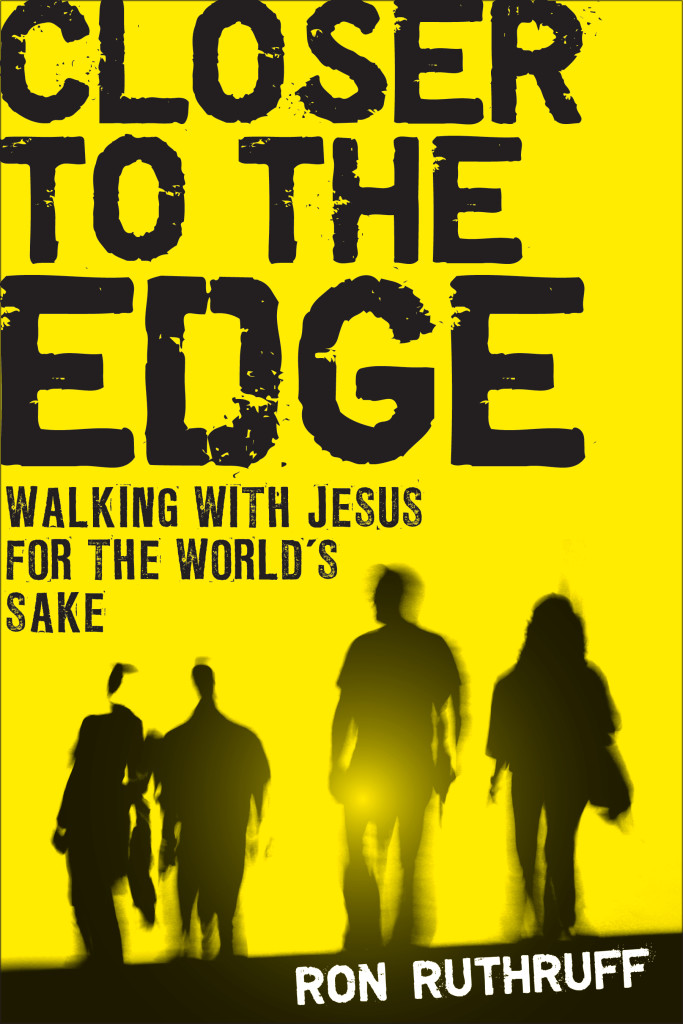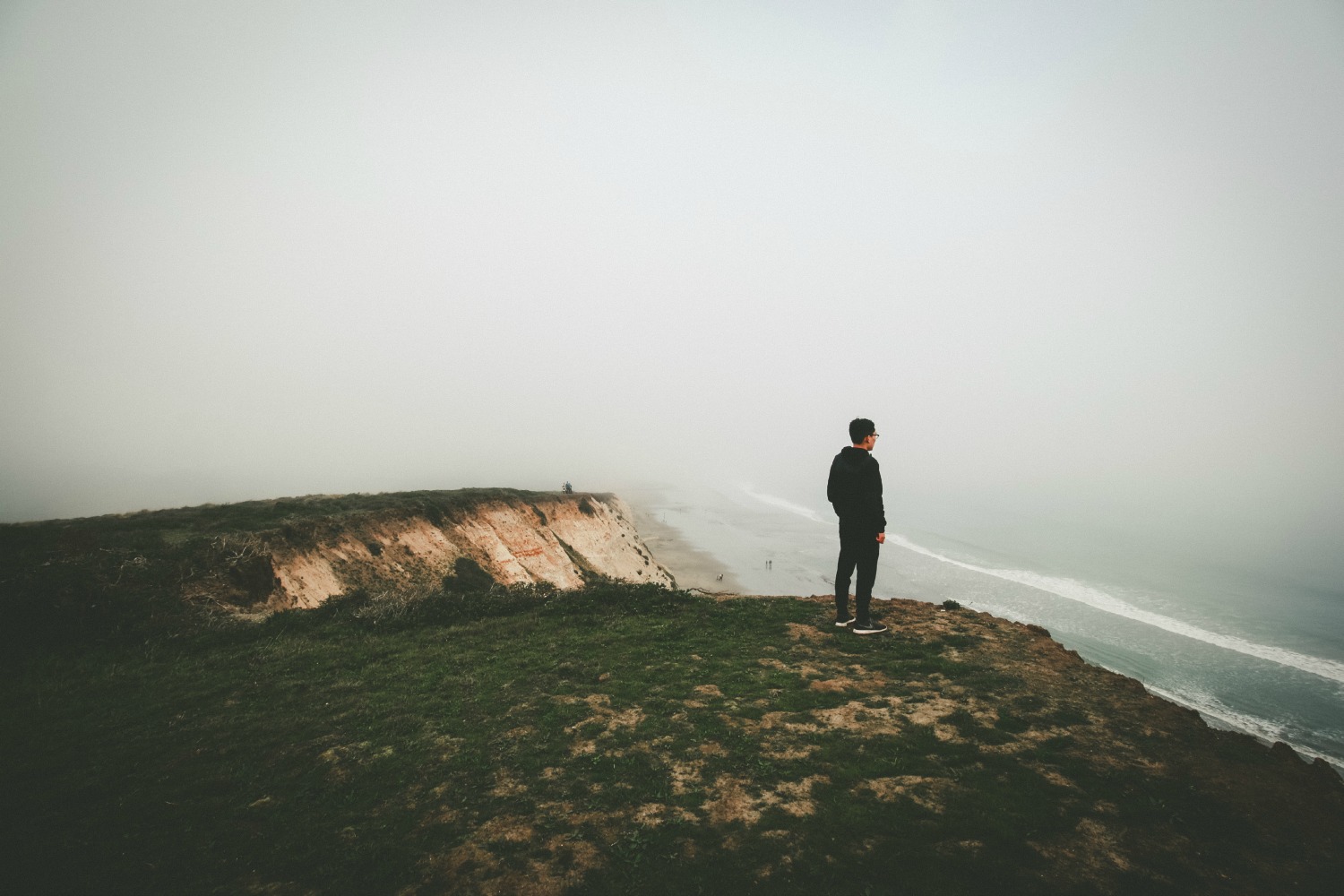Dr. Ron Ruthruff, Associate Professor of Theology & Culture, is completing work on a new book that will be published later this year. In Closer to the Edge: Walking with Jesus for the World’s Sake, Ruthruff shares stories and offers reflections about sacrificial love for all of our neighbors and the radical call of Micah 6:8: Do justice, love mercy, and walk humbly with your God. “The way you treat the person you love the least is the way you love God the most,” says Ruthruff. Closer to the Edge is scheduled for publication in November 2015. In the meantime, we are thrilled to share the following excerpt from the book’s introduction.
When I was young I lived in my imagination. My mother raised me by herself, and she was wonderful. I lived in my imagination because my playmates were few and infrequent. This led to many imaginary friends, like Pete and Frank. They were two of my closest buddies and were willing to reenact Civil War battles, in which we would fight for the Union cause of freedom, and Vietnam skirmishes that would always end in our being saved or saving the buddy next to us. Frank and Pete were always faithful, brave friends, and I could not have imagined any better.
My mother was a courageous, strong woman, who was terrified that something would happen to her only son, the only living memory of her husband, my father, who died too early and left his wife to protect her little boy. I was three years old and my sisters were grown when this crisis hit my family. It’s also when I started living in my imagination, because risk was to be avoided at all cost. My mother worked a lot, and fear became a guiding force that babysat me in her absence.
When I was probably five or six, my mother’s sister Erma and her husband Frank visited us from Michigan. My Aunt Erma was beautiful in a 1940s Midwest sort of way, and Uncle Frank was big and strong and kind, like you would expect a man from Iowa to be. We took a few day trips, one to Diablo Dam. I still remember it was a beautiful spring Washington day. I remember what I wore, because it was what I always wore: a gray felt cowboy hat, blue jean jacket and jeans, a two-gun toy belt, and suede cowboy boots. My uncle Bill always called me “Tex” because little Ronnie always wore six-shooter guns and boots. I wore those boots until I wore a hole in the sole the size of a 50-cent piece.
The moment that stands out in my mind that day happened in the parking lot, or maybe at a viewpoint near the dam. I was being pretty squirrely. The two-hour drive in the back of my mother’s 1968 Dodge Dart had almost paralyzed me, and the minute I stepped out of the car, I needed to get the wiggles out. With a burst of energy I ran toward the lake that lay below the dam overshadowing the parking lot. As I galloped to the edge of the overhang, my big uncle Frank reached out and grabbed my jacket with a kind but cautious “Be careful, Tex” grab. I don’t know if I was in imminent danger. I don’t know how far the drop or how deep the water, and I don’t know how many times my mother told the story afterward, but it was enough that I soon lost count.
According to her, the drop was deadly and the white water tumultuous, and as the gravel kicked away from my boot, it tumbled over the edge like feathers being dumped from a pillow. My life had been miraculously spared that day, and my mother spared the horror of losing both men in her life. She never mentioned my uncle Frank as she retold me the story, the strong hand that caught me regardless of how rambunctious I happened to be. My mother felt it was her job to keep me safe and vigilant and on the straight and narrow, by any means necessary. Lesson learned. Do not get too close to the edge. To my mom, this was the principle directing her life and experience of faith: getting it right, staying away from the edge and as far away from the world as possible. In many ways, if I am honest with myself, much of my wounding and my strength is tied to this story. It is also the catalyst for writing this book.
Now as I look back, I have to admit that much of what I write is reflections on places and people that have revealed to me faith, hope, and love—faith, hope, and love in places where brokenness abounds and, as crazy as it sounds, grace is far more obvious. As I truly rub elbows with folks on the train, in my neighborhood, and in some amazing places I will never totally understand, I see in our joy the story of God’s desire to be with us, and in our pain, what we call injustice, I see the absence of God. But a strange absence, making room for something divine.
 So I invite you to read, not the book, but the places in your own life where, simply living life in all its complicated mess with other human beings, you see God, and you see the absence of God, and in humility you declare the way things are and the way things are supposed to be.
So I invite you to read, not the book, but the places in your own life where, simply living life in all its complicated mess with other human beings, you see God, and you see the absence of God, and in humility you declare the way things are and the way things are supposed to be.
As you walk with me through the pages of this book, I encourage you to let the place where you live reveal the best and the worst in you. I ask you to resist the impulse to fix things too fast, rather wait—wait!— with those who are suffering. It could be the most caring thing you do declaring, in your inability to help, that life is indeed hard and easy answers are usually wrong. I challenge you to look for the Kingdom of God in strange and awkward places; it usually grows as something that doesn’t look all that heavenly. Trust that you are being sent into the world and believe that the world needs acts of mercy, systems of justice, and communities that have the courage to set bigger tables. Remember the journey we are invited on is a journey where life dies when we hold too tightly and blossoms when we let go.
The real question of the book is how far we are willing to go in this walk with Jesus. Are we willing to admit to others that we too have faced wilderness, desert, exile? Do we walk into death thinking that new life is formed there? This is a ridiculous invitation unless you really believe, I mean really believe, that losing your life is the only way to find it and that Resurrection is real. A Resurrection that does not push us into the afterlife, but pushes us back into the world, with confidence, courage, fear, and trembling to live our lives honestly for the world’s sake, trusting in the power of grace, mercy, compassion, and justice, believing that this journey is not just for the world’s sake but that in this walk we save our own lives as well. We walk to reveal that the love of God, lived through Jesus, sustains us even in death!
With all respect to my dear mother, who did what she thought was right to protect me, it is my hope to live a little closer to the edge. To learn to live as an honest, just, and merciful human being. I believe that the story of Jesus is the story of a God who risks everything and invites us to do the same. It is with all faith and assurance in this holy and human story that I take a step a little closer to the edge, maybe uncomfortably so for some. My desire is to consider how good news calls us to love radically and, as an act of deep trust in the story of God, live a bit more recklessly for the sake of the world. Here’s to walking a little closer to the edge and trusting that a hand has already caught me.

